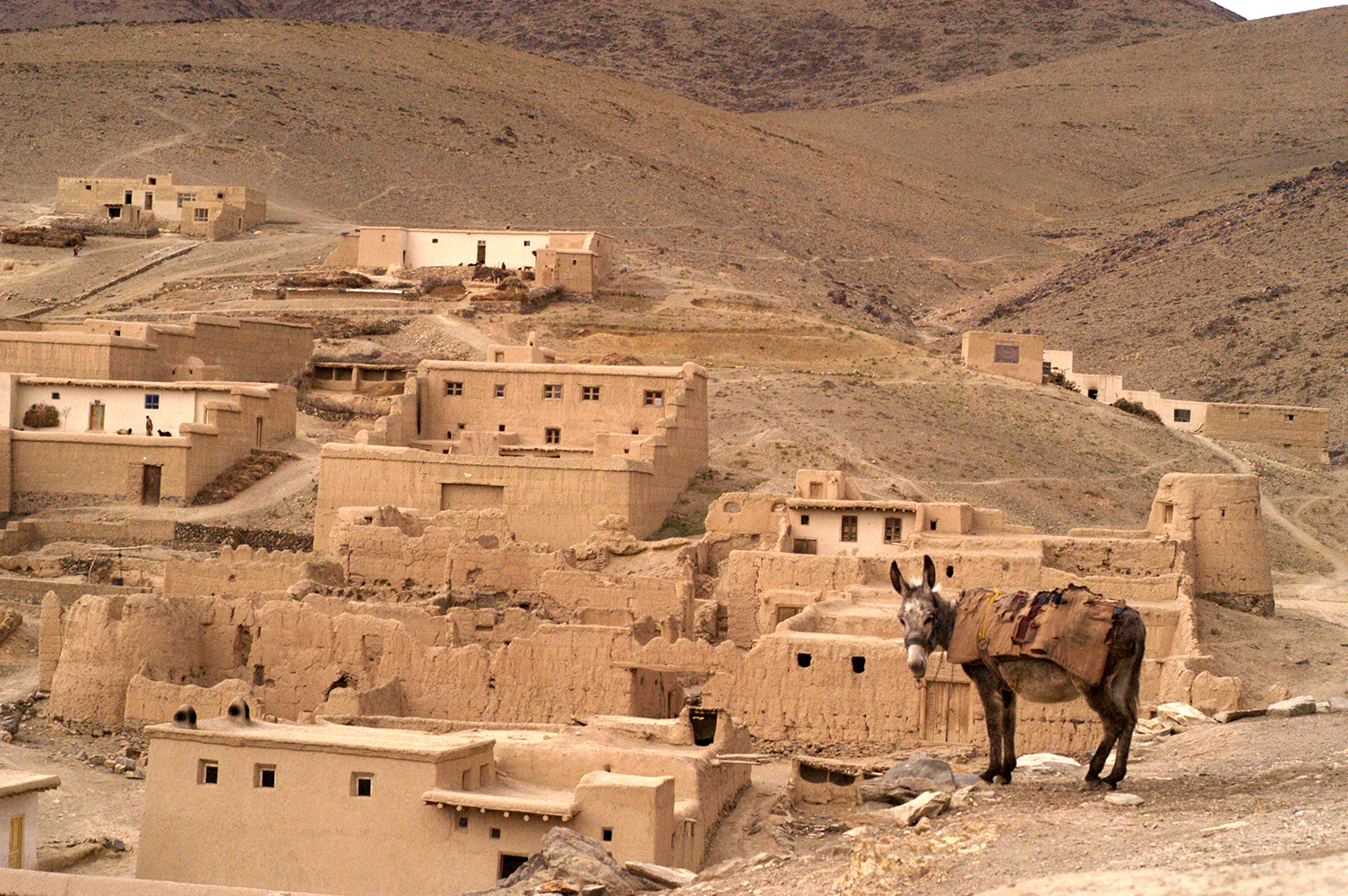We had just left the airport. I was exhausted. But also exhilarated, nervous, relieved to be there. I had spent nearly 48 hours in airports, waiting and wondering what it would be like. It had been a mix of nerves, adrenaline, prayers and kind strangers who had gotten me this far. And here I was in a new country, with only 1 familiar face, now following 2 men past the crowds. Sailing through customs and baggage claim, we left the airport long before the rest of the quirky, international melting pot of ex pats and drove into my first 20 minutes in Kabul.
There were beige, sandy mud-colored buildings everywhere. There were blue plastic tarps covering walls and roofs that had been blown off buildings in explosions. Bullet holes in everything. Mud walls deteriorating on houses that looked like ruins but were still clearly occupied. A whole city in ruins, but still, clearly occupied. We headed through the dusty streets quickly, too quickly perhaps for the size of the roads and the number of people walking in and through the traffic. The streets themselves seeming to only provide levitating dust to lend to the sand colored dystopia I was only just getting acquainted with. And then we stopped. Sher snaked the SUV through what room there was amongst the slowing cars. There were no lanes or lines, traffic signs or rules. Just a vehicular choose-your-own-adventure where all the cars ultimately end up on the same path, inching ever closer until we could go no further. I was happy to stop, glad to take in the sights of a completely unknown city. My cultural lexicon was fairly dry: there were so few photos, movies or famous landmarks from this city that I could connect to; nothing much in this landscape to shape pre-conceived expectations. I would have felt more environmental context had I been on the moon. But I was in Kabul, the country’s capital city, at a stand still, in what was supposed to be a war-torn, oppressively misogynistic, poverty stricken, nearly failed state. And I had no prior idea of what that would really look like.
While I was happily looking at the dusty piles of indiscernible goods being sold in the nearest open-air store fronts, I heard yelling. Loud yelling to my right. I turned to see the car next to us, close enough to touch, had their windows open. Three middle aged men were yelling at us, arms angrily gesticulating out the windows to accentuate their hostility and disdain. I thought it was perhaps a traffic issue, I mean, why would it not be in this chaotic mess? Not understanding the language, I watched as Nasrine quickly pulled her lazily drooping scarf back up over her head while the two men in the front seats yelled back. Nasrine translated that the men were upset about her hair being visible – yes, from inside another car – while in public. Our driver – our men – were a disgrace to allow such blatant liberties with the “property” they were carting in the backseat. The yelling back and forth between cars continued as I made sure my hair was covered. “You’re ok” I was told “You’re foreign, they can’t yell at you”. I pulled my scarf tighter. No need to garner any unnecessary attention. Heads were now covered, unfamiliar men could now feel at ease, saved from visual sin in the neighboring car.
As we sat, wondering what had occurred up ahead to cause such a long stop, people started moving through the cars, slowly, hobbling, shuffling, stopping. Covered in the pervasive dust, these sand-colored, sun chapped shadows of humans found their way to our car. Most specifically to my window. Despite my head covering, I was clearly foreign to them. They came slowly, at times gathering and then being encouraged to move on through harsh words from the front seat that I didn’t understand. They were old, young, mutilated, scarred, burned, blind, amputated. They were human, but mostly skeletons. They sang or begged through the window “Khirat bete, khirat bete”. Give me charity. The cracked fingers pawed pathetically, the dirty palms pressed the windows, silently calling for me to connect my own hand to theirs. To see them. To give them money, of which, as yet, I had none. I would look and then look away, moved by the sight but instructed to keep my window up and give nothing. If I did we’d be surrounded. The other 3 in the car were unmoved and it was clear this was nothing new to them. The scars, the burns, the missing limbs, the calls of “Khirat bete” were just an inconvenience of the landscape. Normal. And eventually the beggars moved on to hands with cash reaching out from other windows. It felt cold but I knew I would never have enough for them…and maybe no one ever would.
To the left of the car, an older man came walking by, people on the street staring at him. He was staring straight ahead, stoic, not looking. There was a stain on his shirt. A woman, walking behind him, followed with her head up, also staring straight ahead. In her arms she held a child, about two or three years old. His head was hanging back across her arm. His bare arm hanging down towards the ground. The blood was covering his head and dripping down off the ends of his little fingers. Still dripping, but he was gone. Behind them, a younger woman walked, hiding her face, shoulders quietly shaking with tears. From the car erupted the noises of “tsk, tsk , tsk” from each of their mouths. And I made no sound. This was my first 20 minutes in Afghanistan and a child had lost his life. I had no idea what I was in for. All of this and I hadn’t even gotten from the airport to the house. The car held soft murmurs of a traffic accident and “it happens all the time”. It was mostly quiet as the traffic then started to move and we drove past the place it had happened. There was blood but nothing else. There were no lingering policemen taking reports or pictures. There was no ambulance that sped off. The boy’s family had taken him away, surely just walking back home where they would clean his body themselves and bury him within the traditional three days. No hospital. No death certificate. No authorities to inform. Just a funeral and grief, if grief can still be mustered above the numbness built up in a war-torn country.
Welcome to Afghanistan. Obviously, life is hard there. Not just because of war but because of the failings of a political system that pre-dated and incited invasions. Because of the long term effects of unending war. Insecurity and failing infrastructure. Poverty and Instability. Ethnic and religious division. Violence. Oppression. Imperialism. Communism. Extremism. Hopelessness. How do you build a country from scratch in the face of hopelessness? You just try. And you still have to go on. Children are still happy there. They play and help their families. But the survival rates of infants and toddlers is one of the worst in the world. Most won’t get any kind of birth certificate until they attend school because many won’t survive that long. That little boy certainly had no birth certificate and no death certificate. Nothing official to say he was here on this planet or that he left this planet. Nothing but his families memories. And mine. I like the idea from Mexican culture of keeping a Dia de los Muertos offrenda, for me, an imaginary offrenda, set up with the pictures and memories of those who have passed. There aren’t many children on my offrenda but that is where this boy stays for me. Maybe it’s because it was my first introduction to Afghanistan. Maybe because it didn’t seem like such a big deal to anyone, nothing more than some tsk, tsk, tsks. Maybe because he has no certificate, no paper. I come from a culture of paper.
We need forms and signatures, certificates and legal documents. Proof of life, graduations, marriages, deaths. A license for everything. We look to paper for our histories and scriptures. But we weren’t always this way. We once had to be rich to own a papyri, or to read or write .There was a time when we all just existed and most of us never had our stories put to paper to be commemorated. A time before we held paper money, passports or a numbered card for social security. My own story in Afghanistan was altered painfully by signed papers of marriage and conversion – papers I can never get back or change – that induce hurt and guilt. But papers, often, ultimately mean nothing. A signed confession means nothing under duress. The unofficial love in 2 people’s hearts may mean more than any cold, forced signature signed at a wedding. And yet I still find myself wanting that boy to have papers. The official acknowledgement of a life that impacted mine. Could his family ever imagine that 17 years after his death a women in Southern California was there that day and remembers him? Would they believe he is part of my story and that their tragedy was what awaited my arrival? That today I cried for him and for them and because he represents the stories of children all over the world who have left this life with so little acknowledgement? So today I’m taking him off my imaginary offrenda and giving him a story; this paper.
In this life, I will never know his name, but perhaps I will in the next. Will I meet him someday in eternity and say “Your life mattered to me”? If he’s with Jesus, he already knows that. A lot of people say all children go to heaven. I have no idea if that’s true, if all kids get a pass. But I like to believe that it is. I like to believe that little boy was taken to heaven that day. I like to believe that I’ll be there too. And that someday, when I die, this nameless boy who sits on my offrenda and now on this paper, might just be there in heaven to meet me. He might be playing when I get there and not be the first in line to greet me, but, then again, maybe he will be. And we’ll see each other and I’ll ask his name. I’ll say “I always remembered you” and “You changed me” and we’ll hug because, once again, he might be there in my first 20 minutes.



